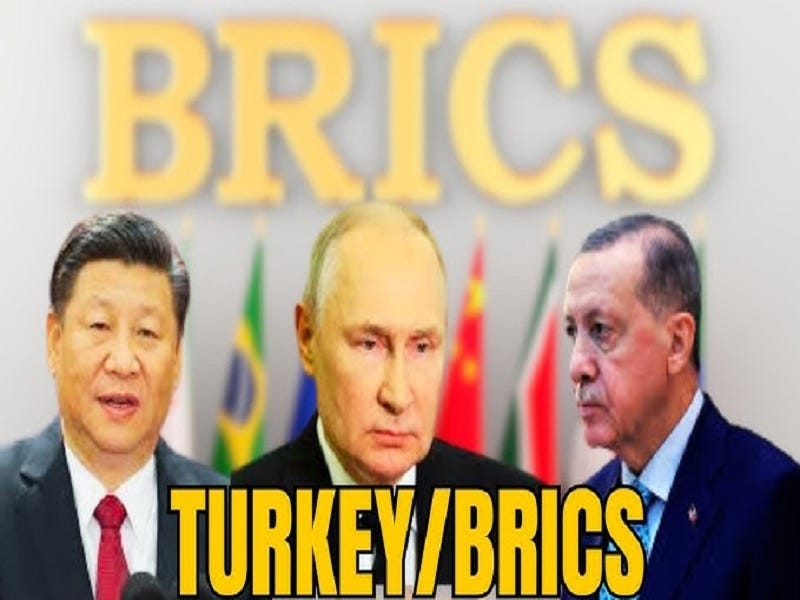BRICS can be compared to a Zoom conference: members actively participate in talks on financial multipolarity, partners observe their discussions in real time, and everyone else with an interest in them hears about the outcome afterwards.
Turkiye prompted a debate about the merits of BRICS membership upon Russian Presidential Aide Ushakov’s confirmation that it had officially applied to join the group and reports that President Erdogan plans to attend October’s Summit in Kazan. Russian Foreign Minister Lavrov was asked about whether its existing membership in NATO is incompatible with BRICS, to which he responded that “BRICS has no rules that would say members of certain organizations cannot have relations with this association.”
This top diplomat then added that “The main thing for full-fledged members and countries developing various forms of cooperation with BRCIS is to share common values that are different from the ones the European Union has been defending in Ukraine. All BRICS members stand ready to comply with provisions of the UN Charter in their entirety and interconnection. Not on an optional or random basis. For this is what constitutes multipolarity.”
While some might think that Turkiye’s votes against Russia at the UN would disqualify it from membership in BRICS based on the above criteria, they should know that BRICS co-founder Brazil has voted against it without consequence, as have new members Egypt, Saudi Arabia, and the UAE. Just like BRICS has no rule that members of certain organizations can’t have ties with it, so too does it have no rule saying that those who vote against the group’s members can’t join or must leave if they do.
In fact, BRICS actually doesn’t have any codified rules since it’s just a network of countries that voluntarily coordinate their financial policies with a view towards accelerating this dimension of the global systemic transition to multipolarity. That point was elaborated on in this analysis here, which also links to ten related ones from the past 18 months to debunk the popular but nevertheless false perception that BRICS is a bloc, let alone an anti-Western one.
Considering this, BRICS can be compared to a Zoom conference: members actively participate in talks on this subject, partners observe their discussions in real time, and everyone else with an interest in them hears about the outcome afterwards. There are no “rules” since everything is voluntary due to economic and geopolitical contradictions within the group. Any country can therefore formulate their associated policies based on BRICS’ recommendations even if they have no formal relationship with it.
Joining as an official member just gives them a say in roundtable talks and the prestige that it brings. It's also convenient for officials to meet with each other during the year’s dozens of events in order to more closely coordinate their respective policies, ergo the importance of membership, while partner status (the criteria of which will be revealed next month) enables one to observe these events. Everyone else is behind them in coordinating their policies, but they can still learn from these events’ outcomes.
With all this in mind, Turkiye’s BRICS membership or lack thereof isn’t actually that big of a deal, with only those in the Alt-Media Community who have false perceptions about the group and those officials who focus more on the prestige element being overly concerned with it. Membership would indeed boost Turkiye’s international profile and enable it to more closely coordinate financial multipolarity policies, but partnership status or none at all wouldn’t prevent it from voluntarily doing this on its own.





Too many people are too eager to see a multi-polar world and usage of USD for international trade on a voluntary basis. However, things change slowly. Physical constraints of everything never change. For example, Iran does not have many fresh vegetables to export while China needs a huge amount of import for raw materials. The seller can always request a certain form of payment. If the trades are always done in buyers' currency, an imbalance will build up forcing political figures to reach balanced trade, but balanced trade is usually difficult. This is why Russia has a large surplus of Indian Rupees. BRICS have their plates full simply to deal with trade issues and international settlement. Synchrony in diplomatic gestures can be faked but difficult to achieve due to practical reasons.
The BRICS experiment is of mutual, trustworthy cooperation between consenting national leaders. No preaching, rulemaking, punishments or ostracizing. Trade settlements will be worked out so as to enable the strengthening & stability of local currencies. The essentials of this will be announced in October. Naturally, it will likely develop fully as it is implemented over time. The entire point is national economic & cultural sovereignty.
Though the "de-dollarization" angle has been constantly stressed by onlookers, the point is simply to be free of an imposed constrictive economic & financial structure. There's no reason for the Chicago Mercantile Exchange to dictate commodity prices or the London Metals Market to dominate those values. There's no reason to have trade revenues pass through New York or London banks when the countries involved have nothing to do with those banks. China is happily collecting dollars in its mighty trade surplus with USA & recycling those dollars into projects around the world. Ultimately, any system is as good as the people who use it. When people abuse it, another must arise so people have another chance at making it work for all equally.